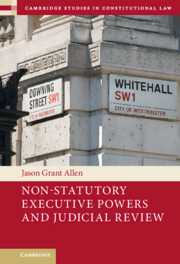Refine search
Actions for selected content:
6 results
3 - The ‘Third Source’ in the Courts
-
- Book:
- Non-Statutory Executive Powers and Judicial Review
- Published online:
- 18 August 2022
- Print publication:
- 25 August 2022, pp 37-61
-
- Chapter
- Export citation
4 - A Unified Category of ‘Non-Statutory Executive Powers’
-
- Book:
- Non-Statutory Executive Powers and Judicial Review
- Published online:
- 18 August 2022
- Print publication:
- 25 August 2022, pp 62-78
-
- Chapter
- Export citation
8 - Approaching Judicial Review
-
- Book:
- Non-Statutory Executive Powers and Judicial Review
- Published online:
- 18 August 2022
- Print publication:
- 25 August 2022, pp 175-197
-
- Chapter
- Export citation
9 - Competence, Conduct, and Validity
-
- Book:
- Non-Statutory Executive Powers and Judicial Review
- Published online:
- 18 August 2022
- Print publication:
- 25 August 2022, pp 198-239
-
- Chapter
- Export citation
2 - Official Action beyond Statute
-
- Book:
- Non-Statutory Executive Powers and Judicial Review
- Published online:
- 18 August 2022
- Print publication:
- 25 August 2022, pp 16-36
-
- Chapter
- Export citation

Non-Statutory Executive Powers and Judicial Review
-
- Published online:
- 18 August 2022
- Print publication:
- 25 August 2022
